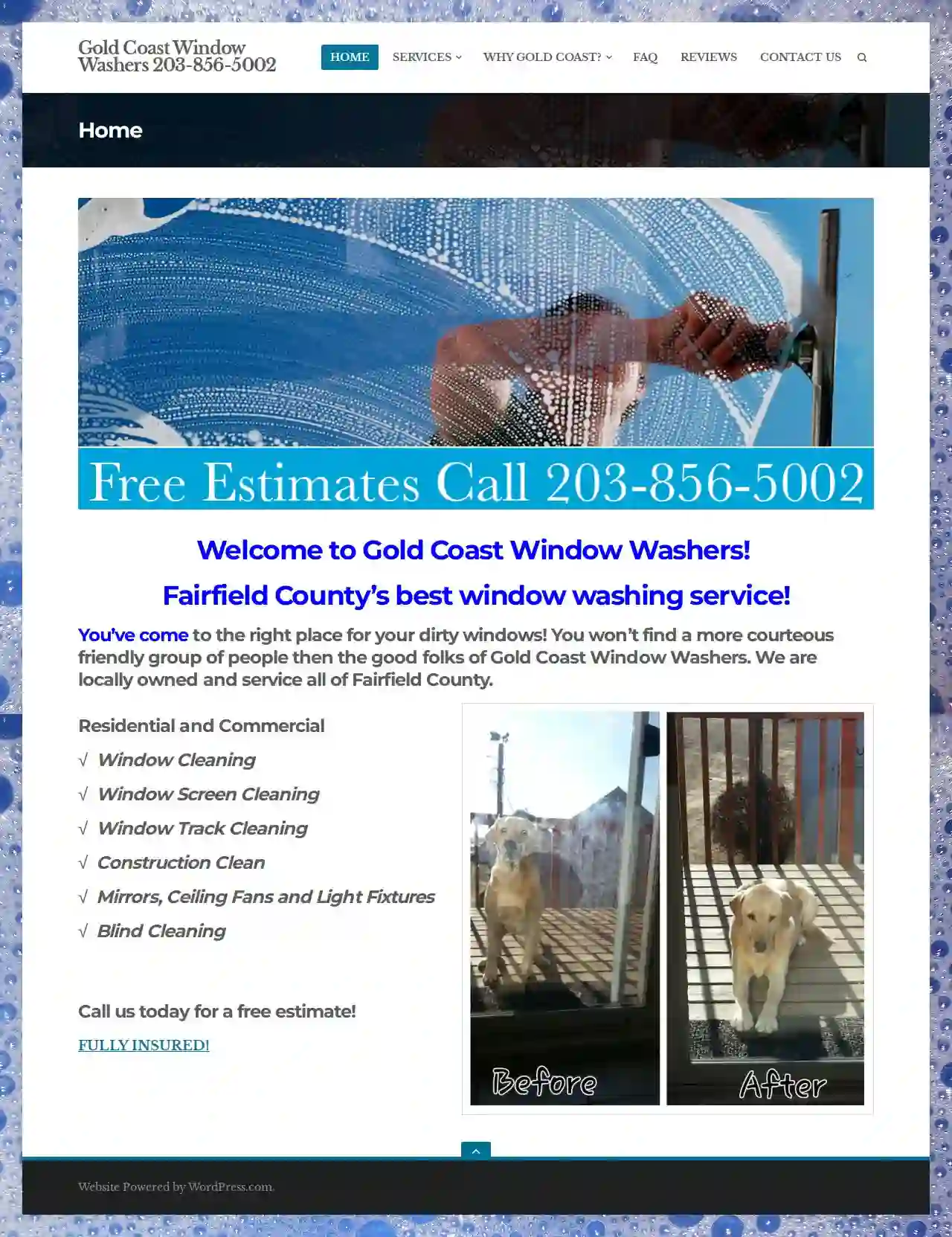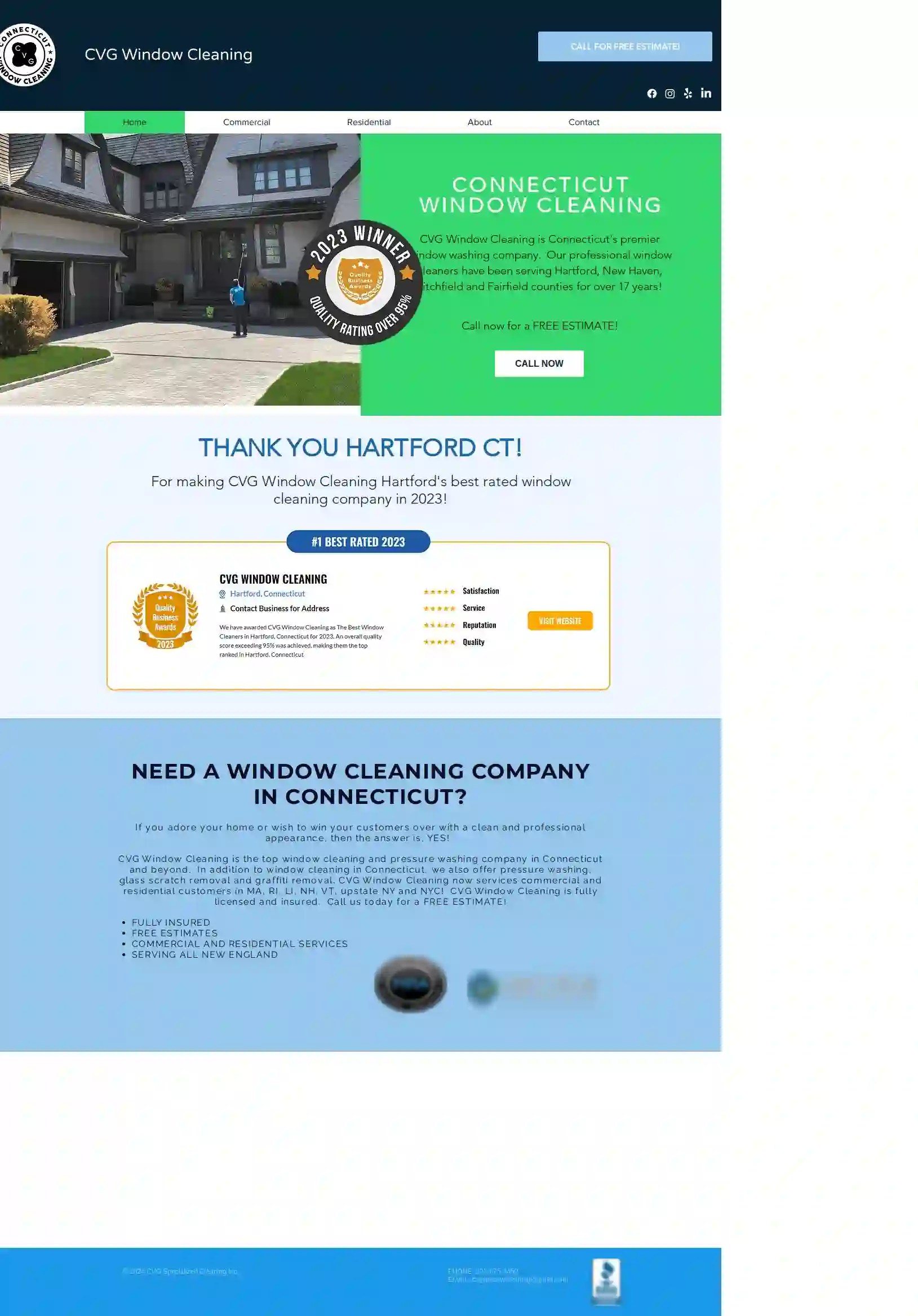Window Cleaning Oxford
Top 10 Professional Window Cleaning in Oxford
Get up to 3 Window Cleaning quotes for your project today! Compare profiles, reviews, accreditations, portfolio, etc... and choose the best service.

Gold Coast Window Washers
4.980 reviewsBridgeport, USWelcome to Gold Coast Window Washers! Fairfield County’s best window washing service! You’ve come to the right place for your dirty windows! You won’t find a more courteous friendly group of people then the good folks of Gold Coast Window Washers. We are locally owned and service all of Fairfield County. Residential and Commercial √ Window Cleaning √ Window Screen Cleaning √ Window Track Cleaning √ Construction Clean √ Mirrors, Ceiling Fans and Light Fixtures √ Blind Cleaning Call us today for a free estimate! FULLY INSURED!
- Services
- Why Us?
- Gallery
Get Quote
Castle Window Cleaning & Power Washing
5164 reviews53 Webster St, Fairfield, 06825, USCastle Window Cleaning and Power Washing is a top-rated power washing company in Fairfield County CT, committed to transforming residential and commercial properties with our exterior cleaning services. We understand that each client's needs are unique, and we offer a range of services including house washing, roof cleaning, window cleaning, gutter cleaning, driveway cleaning, fence cleaning, deck and patio cleaning, pool deck cleaning, rust removal, solar panel cleaning, and Christmas lights installation. Our team of professionals uses specialized power washing technology to clean trucks and equipment in commercial settings. We pride ourselves on providing exceptional customer service and employing the best pressure washing techniques to deliver great results. Contact us today to request a quote and learn more about our services.
- Services
- Why Us?
- Gallery
Get Quote
Maids of Hartford
511 reviewsHartford, USWelcome to Maids of Hartford – Your Trusted Partner in Creating Sparkling Homes! With over three years of dedicated service, we take pride in transforming houses into havens. As your premier residential cleaning service, our commitment to excellence shines through every sparkling surface. Explore our home page to discover the magic of a meticulously cleaned living space. From tailored cleaning solutions to a team of dedicated professionals, we're here to elevate your home experience. Because at Maids of Hartford, a clean home is the heart of a happy home.
- Services
- Why Us?
- Our Team
- Testimonials
- Gallery
Get Quote
Expert Cleaning
5152 reviewsBridgeport, USExpert Cleaning LLC is a family-owned and operated exterior cleaning company serving New Haven, Milford, West Haven, Waterbury, Meriden, Fairfield County, and surrounding areas. We are a top-rated company dedicated to providing 100% customer satisfaction with our safe, effective, and dependable cleaning services. Our team utilizes the best cleansers and machinery, along with advanced training, to clean a wide variety of outdoor surfaces. We understand that your home is a valuable asset, and we strive to become your trusted partner in maintaining its exterior beauty. We offer a range of services, including house washing, pressure washing, roof washing, gutter cleaning, window cleaning, and deck cleaning. Our meticulous approach removes streaks, stains, dirt, mold, mildew, algae, pollen, insect nests, and other organic substances, leaving your outdoor areas looking their best. Contact us today for a free estimate and let us take care of your exterior cleaning needs.
- Services
- Why Us?
- Gallery
Get Quote
N & N Cleaning
1000 Newnan Crossing Bypass, Suite 100, Newnan, 30263, USNN Cleaning Company is a family-owned and operated business serving the greater Newnan, Georgia area. We are dedicated to providing high-quality cleaning services to residential and commercial clients. Our team of experienced and reliable cleaners is committed to exceeding your expectations. We offer a wide range of services, including regular cleaning, deep cleaning, move-in/move-out cleaning, and more. We use eco-friendly cleaning products and techniques to ensure a healthy and safe environment for you and your family.
- Services
- Why Us?
- Our Team
- Testimonials
Get Quote
Window Genie of North Connecticut
4.798 reviews123 Main St, North Connecticut, USWindow Genie of North Connecticut is a professional window cleaning and pressure washing company that provides top-notch services to residential and commercial customers. With a team of experienced and trained technicians, we use the latest equipment and eco-friendly solutions to ensure a sparkling clean finish. Our services include window cleaning, pressure washing, solar panel cleaning, gutter cleaning, and more. We pride ourselves on our commitment to customer satisfaction and our ability to provide a hassle-free experience. Contact us today to schedule your appointment and experience the Window Genie difference!
- Services
- Why Us?
- Gallery
Get Quote
CVG Window Cleaning
4.823 reviewsHartford, USCVG Window Cleaning has built strong relationships with local and national businesses, including retail chains, property management companies, and construction firms. With a commitment to safety and meticulous attention to detail, CVG Window Cleaning has become Connecticut's top choice for high-quality and reliable window cleaning services. Sparkling clean windows can enhance the ambiance and appeal of your property or storefront.
- Services
- Why Us?
- Gallery
Get Quote
Top Window Cleaner
56 reviews49 Putnam Blvd, Glastonbury, 06033, USYour friendly neighborhood window cleaner at your service! 😁 We take extreme pride in our detailed 5-step cleaning process because we know just how important windows are to your business and/or home. We look forward to providing you with top-notch customer service with our 100% Satisfaction Guarantee!
- Services
- Why Us?
- Testimonials
- Gallery
Get Quote
SCRUB-A-RAY LLC
511 reviewsWindsor, Connecticut, United States, 06095, USAt SCRUB-A-RAY LLC, Rob started this Exterior Cleaning business with a passion for providing an unmatched customer service to our clients. Rob has always been service oriented. He is currently serving his 12th year in the CT Army National Guard. He fully understands integrity and attention to detail. We are dedicated to delivering high-quality cleaning services that exceed our clients' expectations. We offer a wide range of cleaning services including: solar panel cleaning, window cleaning (interior/exterior), screen cleaning, gutter cleaning, power/soft washing and also dryer vent inspection and cleaning. Our team of professional cleaners are fully trained and insured, We take pride in providing a reliable and trustworthy service. Servicing Windsor and surrounding towns We stay in constant communication with our customers until the job is done. To get a free quote, or if you have questions or special requests, just give us a call.
- Services
- Why Us?
- Our Team
- Gallery
Get Quote
Fish Window Cleaning
4.6177 reviews342 Quinnipiac Street, Wallingford, 06492, USWelcome to Fish Window Cleaning of South Central Connecticut. For 20 years, we have been serving the shoreline and New Haven County - Branford, New Haven, Wallingford, Meriden, Southington, Cheshire, Hamden, North Haven, East Haven, Milford, Orange, Woodbridge, Northford, West Haven, Clinton, Guilford, Madison, Westbrook, Old Saybrook, and Killingworth, CT! Locally owned and operated, we are your local, OSHA certified, window cleaning, pressure washing, soft wash, gutter cleaning, awning cleaning, light fixture cleaning, and solar panel cleaning company. We provide the following services: Commercial Window Cleaning Residential Window Cleaning Pressure Washing Soft Wash Gutter Cleaning Awning Cleaning Light Fixture Cleaning Solar Panel Cleaning If you call us today, in most cases, our experienced, uniformed and insured staff will be able to clean your windows at your home or business within ONE WEEK. Cross window cleaning off your list by calling us today. Is your home or business in West Hartford, Farmington, Avon, Canton Center, Unionville, or Collinsville? If so, please click here to visit our West Hartford location website. Fish Window Cleaning is proud to support Semper Fi & America's Fund. Semper Fi & America's Fund is a 501(c)(3) organization that supports veterans of all branches of the U.S. Armed Forces and their families. They provide direct financial assistance, education support and career assistance, and health and wellness resources, working to ensure no one is left behind. Click here to learn more about Semper Fi & America's Fund. Better Business Bureau Award Winner Our office was recognized by Connecticut Better Business Bureau as 1st runner up for the 2010 Torch Award for Marketplace Excellence. The CT BBB Torch Award for Marketplace Excellence honors businesses who demonstrate high standards of behavior towards customers, employees, and communities; adhere to truthful and honorable advertising and sales practices; they are companies who have earned a reputation for noteworthy contributions to the communities in which they do business. Your Home We provide cleaning of all types of windows, even the hard to reach ones of your home. You can rely on Fish Window Cleaning to
- Services
- Why Us?
- Accreditations
- Our Team
- Gallery
Get Quote
Over 60,241+ Janitorial Businesses on our platform
Our janitorial companies operate in Oxford & surroundings!
CleaningMatch has curated and vetted Top Cleaning Businesses in and around Oxford. Find the most trustworthy contractor today.
Frequently Asked Questions About Window Cleaning
- Increased Natural Light: Clean windows allow more natural light to enter, reducing the need for artificial lighting during the day, saving energy.
- Reduced Solar Heat Gain: Dirty windows can absorb more heat from the sun, increasing cooling costs in the summer. Clean windows reflect more sunlight, reducing solar heat gain and keeping your space cooler.
- Better Insulation: While windows themselves are not great insulators, clean windows allow for better performance of window treatments (e.g., blinds, curtains), which can help regulate temperature and reduce energy loss.
- Experience: 'How long have you been in the window cleaning business?'
- Licensing and Insurance: 'Are you licensed, insured, and bonded?'
- Cleaning Methods: 'What cleaning methods and solutions do you use? Do you use traditional methods or a water-fed pole system?'
- Safety Procedures: 'What safety precautions do you take, especially for high-rise window cleaning?'
- Guarantees: 'Do you offer a satisfaction guarantee?'
- References: 'Can you provide references from previous clients?'
- Twice a Year: Cleaning windows in the spring and fall is a common practice to remove dirt accumulated during the winter and pollen from the spring.
- Quarterly: If you live in a busy city or near a coast with salt spray, more frequent cleanings may be necessary.
- Monthly: For businesses, especially those with high foot traffic or prominent storefronts, monthly cleanings can help maintain a professional appearance.
Can window cleaning improve energy efficiency?
By maximizing natural light, reducing solar heat gain, and improving the performance of window treatments, clean windows can contribute to a more energy-efficient and comfortable indoor environment.
What should I ask a window cleaner before hiring them?
By asking these questions, you can assess their professionalism, experience, and commitment to safety and customer satisfaction.
Do window cleaners clean window screens?
Professional screen cleaning typically involves removing the screens, gently washing them with a cleaning solution, rinsing, and allowing them to dry thoroughly before reinstalling. This process removes dirt, allergens, and other particles, improving both the appearance and functionality of your screens.
How often should I have my windows cleaned?
You can adjust the frequency based on your needs and budget. Consider factors like the visibility of dirt and grime, your tolerance for dirty windows, and the overall appearance of your home or business.
Can window cleaning improve energy efficiency?
- Increased Natural Light: Clean windows allow more natural light to enter, reducing the need for artificial lighting during the day, saving energy.
- Reduced Solar Heat Gain: Dirty windows can absorb more heat from the sun, increasing cooling costs in the summer. Clean windows reflect more sunlight, reducing solar heat gain and keeping your space cooler.
- Better Insulation: While windows themselves are not great insulators, clean windows allow for better performance of window treatments (e.g., blinds, curtains), which can help regulate temperature and reduce energy loss.
By maximizing natural light, reducing solar heat gain, and improving the performance of window treatments, clean windows can contribute to a more energy-efficient and comfortable indoor environment.
What should I ask a window cleaner before hiring them?
- Experience: 'How long have you been in the window cleaning business?'
- Licensing and Insurance: 'Are you licensed, insured, and bonded?'
- Cleaning Methods: 'What cleaning methods and solutions do you use? Do you use traditional methods or a water-fed pole system?'
- Safety Procedures: 'What safety precautions do you take, especially for high-rise window cleaning?'
- Guarantees: 'Do you offer a satisfaction guarantee?'
- References: 'Can you provide references from previous clients?'
By asking these questions, you can assess their professionalism, experience, and commitment to safety and customer satisfaction.
Do window cleaners clean window screens?
Professional screen cleaning typically involves removing the screens, gently washing them with a cleaning solution, rinsing, and allowing them to dry thoroughly before reinstalling. This process removes dirt, allergens, and other particles, improving both the appearance and functionality of your screens.
How often should I have my windows cleaned?
- Twice a Year: Cleaning windows in the spring and fall is a common practice to remove dirt accumulated during the winter and pollen from the spring.
- Quarterly: If you live in a busy city or near a coast with salt spray, more frequent cleanings may be necessary.
- Monthly: For businesses, especially those with high foot traffic or prominent storefronts, monthly cleanings can help maintain a professional appearance.
You can adjust the frequency based on your needs and budget. Consider factors like the visibility of dirt and grime, your tolerance for dirty windows, and the overall appearance of your home or business.